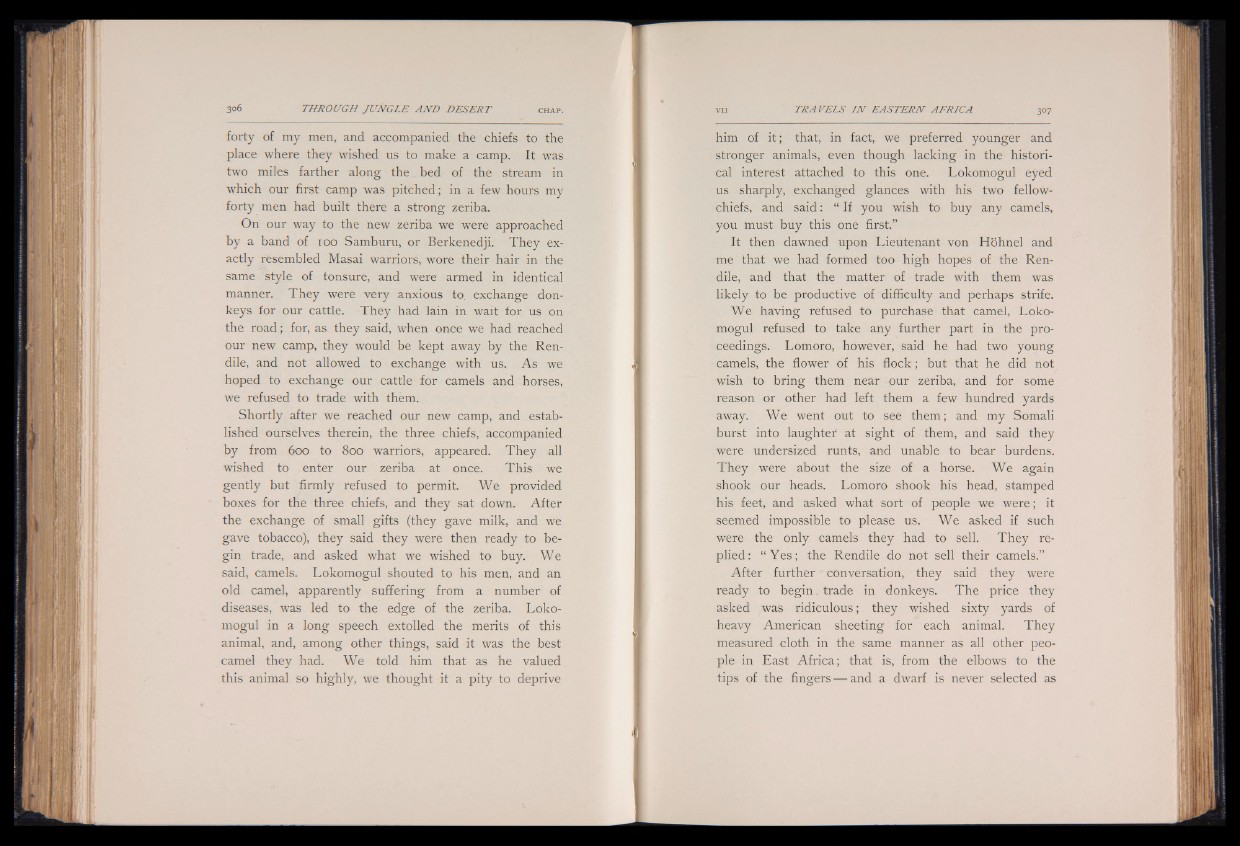
forty of my men, and accompanied the chiefs to the
place where they wished us to make a camp. It was
two miles farther along the _ bed of the stream in
which our first camp was pitched; in a few hours my
forty men had built there a strong zeriba.
On our way to the new zeriba we were approached
by a band of 100 Samburu, or Berkenedji. They exactly
resembled Masai warriors, wore their hair in the
same style of tonsure, and were armed in identical
manner. They were very anxious to. exchange donkeys
for our cattle. They had lain in wait for us on
the road; for, as they said, when once we had reached
our new camp, they would be kept away by the Ren-
dile, and not allowed to exchange with us. As we
hoped to exchange our cattle for camels and horses,
we refused to trade with them.
Shortly after we reached our new camp, and established
ourselves therein, the three chiefs, accompanied
by from 600 to 800 warriors, appeared. They all
wished to enter our zeriba at once. This we
gently but firmly refused to permit. We provided
boxes for the three chiefs, and they sat down. After
the exchange of small gifts (they gave milk, and we
gave tobacco), they said they were then ready to begin
trade, and asked what we wished to buy. We
said, camels. Lokomogul shouted to his men, and an
old camel, apparently suffering from a number of
diseases, was led to the edge of the zeriba. Lokomogul
in a long speech extolled the merits of this
animal, and, among other things, said it was the best
camel they had. We told him that as he valued
this animal so highly, we thought it a pity to deprive
him of i t ; that, in fact, we preferred younger and
stronger animals, even though lacking in the historical
interest attached to this one. Lokomogul eyed
us sharply, exchanged glances with his two fellow-
chiefs, and said: “ If you wish to buy any camels,
you must buy this one first.”
It then dawned upon Lieutenant von Hohnel and
me that we had formed too high hopes of the Ren-
dile, and that the matter of trade with them was
likely to be productive of difficulty and perhaps strife.
We having refused to purchase that camel, Lokomogul
refused to take any further part in the proceedings.
Lomoro, however, said he had two young
camels, the flower of his f lock; but that he did not
wish to bring them near our zeriba, and for some
reason or other had left them a few hundred yards
away. We went out to see them; and my Somali
burst into laughter at sight of them, and said they
were undersized runts, and unable to bear burdens.
They were about the size of a horse. We again
shook our heads. Lomoro shook his head, stamped
his feet, and asked what sort of people we were; it
seemed impossible to please us. We asked if such
were the only camels they had to sell. They replied:
“ Yes; the Rendile do not sell their camels.”
After further conversation, they said they were
ready to begin. trade in donkeys. The price they
asked was ridiculous; they wished sixty yards of
heavy American sheeting for each animal. They
measured cloth in the same manner as all other people
in East Africa; that is, from the elbows to the
tips of the fingers — and a dwarf is never selected as